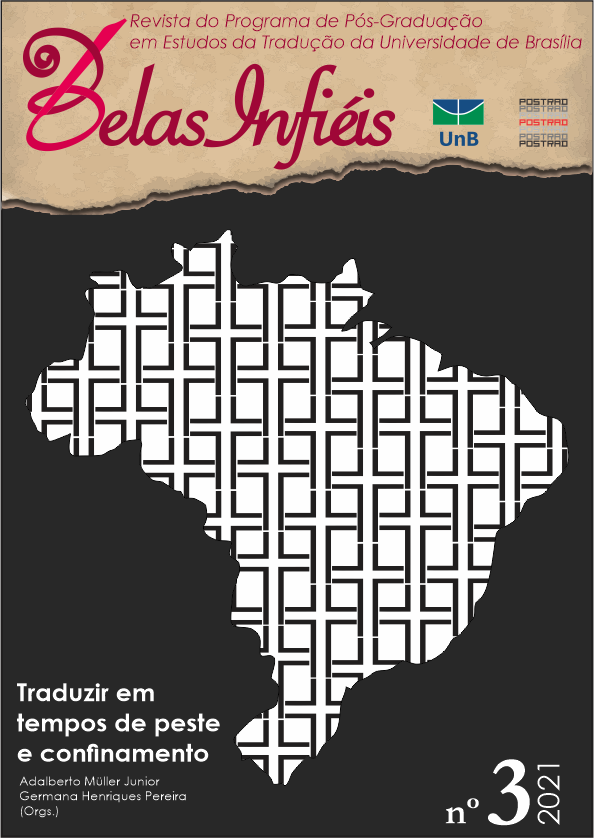Translating in the pandemic: On activist translation and the (counter-)hegemonic media
DOI:
https://doi.org/10.26512/belasinfieis.v10.n3.2021.32693Keywords:
Activist translation. Militant translation. Ethics in translation. Counter-hegemonic media.Abstract
The coronavirus pandemic suddenly and globally transformed our reality, including our interaction with the environment and with other people, among other aspects. Translation has been playing a key role in transmitting information about the pandemic throughout the world, especially during periods of social confinement. Given the large volume of news, as well as the number of media and formats through which it is spread, we asked ourselves a fundamental question: What (counter-)hegemonic political stances do the different media outlets adopt in moments of unusually high vulnerability and social dependency? In order to answer this question, we have conducted a comparative analysis of the translated versions of articles published by two hegemonic Argentinian media conglomerates and two decentralized Latin American media outlets (the first pair bearing an antagonistic relation to the second one) during the first strict quarantine in Argentina (from March 20th, 2020 to May 10th, 2020). Results suggest that translation as a manifestly sociopolitical act allows the expansion of new ”“or marginalized”“ media, which may make the ideal of democratizing information more possible, as well as point out the importance of translators’ agency for the collective ”“and, initially, linguistic”“ construction of a different world.
Downloads
References
Aznarez, C. (2018, 21 de julio). 30 años de “Resumen Latinoamericano”. TeleSURtv.net. https://www.telesurtv.net/bloggers/resumen-latinoamericano-aniversario-treinta-20180721-0003.html.
Baker, M. (2010). Translation and Activism: Emerging Patterns of Narrative Community. In Tymoczko, M. (Ed.), Translation, Resistance, Activism (pp. 23-41). University of Massachusetts Press.
Barbero, J. M. (1991). Modernidad y massmediación en América Latina. In J. M Barbero. De los medios a las mediaciones, de Jesús Martín Barbero 30 años después (pp. 163-259). Ediciones G. Gili. Baker. (Trabajo original publicado en 1987)
Boérie, J., & Delgado Luchner, C. (2020). Ethical issues in activist translation and interpreting. In K. Koskinen, & N. K. Pokorn (Eds.), The Routledge Handbook on Translation and Ethics (pp. 1-31). Universidad de Ginebra.
Campos, J. (2019). Contrainformación, rabia y consciencia: la red Contra Info y sus traductorxs anarquistas. Revista Lenguas V;vas., (19)15, 128-139.
Castro Vázquez, O. (2008). Género y traducción: elementos discursivos para una reescritura feminista. Lectora, 14, 285-301.
Colón Rodríguez, R. E. (2015). La traducción colaborativa activista contemporánea en Canadá y Brasil: comunidades de traducción 1.0 y 2.0 en evolución. Tradução em Revista, 18, 159-190.
Friera, S. (2010, 17 de mayo). Una voz para comunicar con conciencia. Página 12. https://www.pagina12.com.ar/diario/suplementos/espectaculos/17-17978-2010-05-17.html.
Gambier, Y. (2018). Redes de traductorxs/intérpretes benéficxs [J. Campos, Traductora. “Residencia de traducción” del Traductorado en Francés, I.E.S. en Lenguas Vivas. Traducción de: “Réseaux de traducteurs/interprètes bénévoles”. Meta, (52)4, 658-672. https://www.erudit.org/en/journals/meta/2007-v52-n4-meta1954/017691ar/]. (Trabajo original publicado en 2007).
Giraldo Díaz, R. (2006). Poder y resistencia en Michel Foucault. Tabula Rasa, 4, 103-122.
Tymoczko, M. (2010). Translation, Resistance, Activism: An Overview. In M. Tymoczko (Ed.), Translation, Resistance, Activism (pp. 1-22). University of Massachusetts Press.
Williams, R. (2000). La hegemonía. In R. Williams. Marxismo y Literatura (pp. 129-136). Ediciones Península. [P. di Masso, Traductor. Traducción de: Marxism and Literature. Oxford University Press]. (Trabajo original publicado en 1977).
Downloads
Published
How to Cite
Issue
Section
License
Copyright (c) 2021 CC BY

This work is licensed under a Creative Commons Attribution 4.0 International License.
Given the public access to this journal, the texts are free to use but requires the recognition of the original authorship and initial publication in this journal to be properly stated.
 The journal allows the use of works published for non-commercial purposes, including the right to submit the work to publicly accessible databases. Published contributions are the sole and exclusive responsibility of the author(s).Â



















